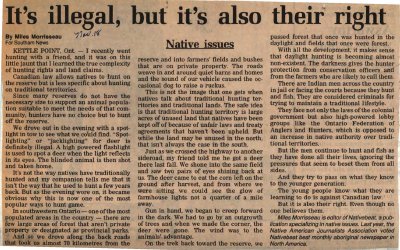"It's illegal, but it's also their right"
- Publication
- Southam News, 18 Nov 1993
- Full Text
- It's illegal, but it's also their rightBy Miles Morrisseau, For Southam News
KETTLE POINT, Ont - I recently went hunting with friend, and it was on this little jaunt that I learned the true complexity of hunting rights and land claims.
Canadian law allows natives to hunt on the reserve but is less specific about hunting on traditional territories.
Since many reserves do not have the necessary size to support an animal population suitable to meet the needs of that community, hunters have no choice but to hunt off the reserve.
We drove out in the evening with a spotlight in tow to see what we could find. "Spotlighting" or "jacklighting" for deer is definitely illegal. A high powered flashlight is used to spot a deer when the light reflects in its eyes. The blinded animal is then shot and taken home.
It's not the way natives have traditionally hunted and my companion tells me that it isn't the way that he used to hunt a few years back. But as the evening wore on, it became obvious why this is now one of the most popular ways to hunt game.
In southwestern Ontario - one of the most populated areas in the country - there are few large areas of forest that aren't private property or designated as provincial parks.
And so we drove along the back roads that took us almost 70 kilometres from the reserve and into farmers' fields and bushes that are on private property. The roads weave in and around quiet barns and homes and the sound of our vehicle caused the occasional dog to raise a ruckus.
This is not the image that one gets when natives talk about traditional hunting territories and traditional lands. The safe idea is that traditional hunting territory is large acres of unused land that natives have been kept off of because of unfair laws and treaty agreements that haven't been upheld. But while the land may be unused in the north, that isn't always the case in the south.
Just as we crossed the highway to another sideroad, my friend told me he got a deer there last fall. We shone into the same field and saw two pairs of eyes shining back at us. The deer came to eat the corn left on the ground after harvest, and from where we were sitting we could see the glow of farmhouse lights not a quarter of a mile away.
Gun in hand, we began to creep forward in the dark. We had to go by an outgrowth of trees and when we made the corner, the deer was gone. The wind was to the animals' advantage.
On the trek back toward the reserve, we passed forest that once was hunted in the daylight and fields that once were forest.
With all the development, it makes sense that daylight hunting is becoming almost non-existent. The darkness gives the hunter protection from conservation officers and from the farmers who are likely to call them.
There are Indian men across the country in jail or facing the courts because they hunt and fish. They are considered criminals for trying to maintain a traditional lifestyle.
They face not only the laws of the colonial government but also high-powered lobby groups like the Ontario Federation of Anglers and Hunters, which is opposed to an increase in native authority over traditional territories.
But the men continue to hunt and fish as they have done all their lives, ignoring the pressures that seem to beset them from all sides.
And they try to pass on what they know to the younger generation.
The young people know what they are learning to do is against Canadian law. But it is also their right. Even though no one believes them. Miles Morrisseau is editor of Nativebeat, a publication specializing in native issues. Last year, the Native American Journalists Association voted Nativebeat best monthly aboriginal newspaper in North America. - Creator
- Morrisseau, Miles, Author
- Media Type
- Text
- Newspaper
- Item Type
- Clippings
- Description
- "I recently went hunting with a friend, and it was on this little jaunt that I learned the true complexity of hunting rights and land claims."
- Publisher
- Southam News
- Date of Publication
- 18 Nov 1993
- Subject(s)
- Corporate Name(s)
- Ontario Federation of Anglers and Hunters.
- Local identifier
- SNPL003915v00d
- Collection
- Scrapbook #5
- Language of Item
- English
- Geographic Coverage
-
-
Ontario, Canada
Latitude: 43.18338 Longitude: -82.0165
-
- Creative Commons licence
 [more details]
[more details]- Copyright Statement
- Public domain: Copyright has expired according to Canadian law. No restrictions on use.
- Copyright Date
- 1993
- Copyright Holder
- Southam News
- Contact
- Six Nations Public LibraryEmail:info@snpl.ca
Website:
Agency street/mail address:1679 Chiefswood Rd
PO Box 149
Ohsweken, ON N0A 1M0
519-445-2954



